
Aug 25
1845 Birth: Ludwig II of Bavaria:
He is known by many nicknames: the Swan King, the Mad King of Bavaria, the Dream King, and Mad Ludwig. Was "Mad King Ludwig" mad? This is only one of many mysteries that surround the former Bavarian regent to this day. Ludwig II (Ludwig Friedrich Wilhelm) has become one of the most legendary figures in Bavarian and German history, a history full of legendary figures.
Other mysteries include the enigma of Ludwig's death by drowning in Lake Starnberg (der Starnberger See) south of Munich. Did he commit suicide or was he "helped"? Ludwig died under mysterious circumstances just three days after being declared legally insane. Today Ludwig's extravagances such as his fairy-tale (and anachronistic) Neuschwanstein castle and his other castles have become a huge tourist draw and a vital source of income for the state of Bavaria. Ludwig's latent homosexuality and his patronage of Richard Wagner have also contributed to the Mad Ludwig legend.
1898 Birth: Helmut Hasse: German mathematician working in algebraic number theory, known for fundamental contributions to class field theory, the application of p-adic numbers to local classfield theory and diophantine geometry (Hasse principle), and to local zeta functions: politically he was a right-wing nationalist, and applied for membership in the Nazi Party in 1937. After war work he returned to Goettingen briefly in 1945 but was excluded by the British authorities.
1900 Death: Friedrich Nietzsche, philosopher, in Weimar, Germany:
Let us face facts: the people have triumphed — or the slaves, the mob, the herd, whatever you wish to call them — and if the Jews brought it about, then no nation ever had a more universal mission on earth. The lords are a thing of the past, and the ethics of the common man is completely triumphant. I don't deny that this triumph might be looked upon as a kind of blood poisoning, since it has resulted in a mingling of the races, but there can be no doubt that the intoxication has succeeded. The 'redemption' of the human race (from the lords, that is) is well under way; everything is rapidly becoming Judaized, or Christianized, or mob-ized—the word makes no difference. (The Birth of Tragedy and The Genealogy of Morals, translated by Francis Golffing, Doubleday Anchor Books, 1956, pp.169-170)
1912 Birth: Erich Honecker—East German political leader.
1914 World War I: Germans burn Belgian town of Louvain: Over the course of five days, beginning August 25, 1914, German troops stationed in the Belgian village of Louvain during the opening month of World War I burn and loot much of the town, executing hundreds of civilians. [For further details, Click here.]

1915 World War I: Various: List Regiment:
Brest-Litovsk falls and the entire Russian front is in complete collapse:
On the 1st August, 1915, the city authorities ordered the city's inhabitants to evacuate, over the next 3 days, the 3rd, 4th and 5th August, the exiled inhabitants received free train tickets, but there were not enough trains sent, so many had to leave on foot or on carts and wagons. In the city there were large supplies of bread, but they were forbidden to take food or belongings with them. Many left their entire fortunes behind, it was heartbreaking to witness the Cossacks and Russian soldiers ransacking and looting the abandoned homes. On 25th August, the Russian army withdrew and set fire to the town, and if not for the German army which arrived the next morning and extinguished the fire, there would not be a trace of the city left.
1916 World War I: List Regiment: Gefreiter Adolf Hitler endures trench warfare in Flanders (Artois) with 3 Company, 16 Reserve Infantry Regiment [List Regiment]. [For further details, Click here.]
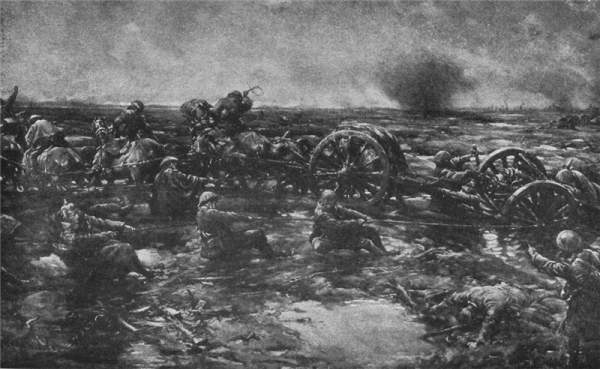
1917 World War I: List Regiment (July 22-September 8): Dispatch Runner Gefreiter Adolf Hitler serves at the front with 3 Company, 16 Bavarian Reserve Infantry Regiment during Phase 2 operations in Flanders. Most of their time in the trenches gas masks are worn, while English bombers attack from the air, and tanks attempt to advance over a long front through seas of mud. [For further details, Click here.]
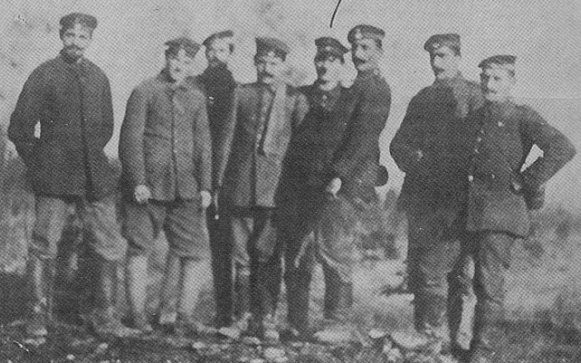
Hitler and his fellow dispatch runners
1918 World War I: Various: List Regiment (August 21-25):
Herr Hitler, as corporal, was a courier for the regimental staff, and was not only always willing to carry out hard tasks, but did so with distinction. I stress that the List Regiment, as might be expected from its history, was at the toughest parts of the front, fighting in frequent major battles. [For further details, Click here.]
[See: Was Adolf Hitler a 'War Hero' in World War I?]Volkishness: A large investiture of novices to the Germanenorden takes place at the Four Seasons Hotel. Pohl gives a lecture on the 'Sun Castles' of Bad Abling, which he believes possess esoteric national significance.
1920 Polish-Soviet War: Battle of Warsaw, started on August 13, now ends. The Red Army is defeated. Before the Polish victory at the Vistula, both the Bolsheviks and the majority of foreign experts had considered Poland to be on the verge of defeat. The stunning, unexpected Polish victory cripples the Bolshevik forces. In the following months, several more Polish victories will secure Poland's independence and eastern borders.
1921 The United States signs a peace treaty with Germany
Considering that the United States, acting in conjunction with its co-belligerents, entered into an Armistice with Germany on November 11, 1918, in order that a Treaty of Peace might be concluded; Considering that the Treaty of Versailles was signed on June 28, 1919, and came into force according to the terms of its Article 440, but has not been ratified by the United States; Considering that the Congress of the United States passed a Joint Resolution, approved by the President July 2, 1921, which reads in part as follows: "Resolved by the Senate and House of Representatives of the United States of America in Congress assembled: "That the state of war declared to exist between the Imperial German Government and the United States of America by the joint resolution of Congress approved April 6, 1917, is hereby declared at an end.
1925 Death: Franz Conrad von Hoetzendorf: Austro-Hungarian field marshal. He was a tireless campaigner for modernization of the armed forces. He was something of a social darwinist, and believed a battle between German and Slavic civilization was inevitable. The power of the Magyar elite within Austria-Hungary troubled him, as he believed it weakened and diluted what he saw as an essentially German empire. Conrad had been one of the main proponents of war with Serbia in response to the assassination of Franz Ferdinand. However, despite his desire for the war, the Austria army did not distinguish itself in its conduct of the war. Conrad often proposed unrealistically grandiose plans, disregarding the realities of terrain and climate. The plans that he drew up frequently under-estimated the power of the enemy.
1929 The Graf Zeppelin passes over San Francisco for Los Angeles after a transpacific voyage:
The global flight would begin in Friedrichshafen and proceed to Lakehurst, New Jersey. Lakehurst would then mark as the official starting point of the journey as stipulated in the contract drawn up by Hearst. From Lakehurst back to Friedrichshafen, to Tokyo and then to San Francisco, Los Angeles and back to Lakehurst. Although the Graf was not the first aircraft to circle the globe, it was by far the fastest. What took months for a British military, heavy bomber to do, with many breakdowns and hardships, the Graf did in 12 days and 11 minutes in comfort and style with a full passenger load over much previously uncharted land. The trip was a complete success and the world, particularly the U.S., caught Zeppelin Mania. Once safely moored at Lakehurst, Dr. Eckener was treated to a ticker-tape parade in his honor in New York City and the news papers would dub him the "Magellan of the Air"
1933 Romania: Military authorities in Czernowitz suspend the Yiddish daily, Der Tog, for criticizing the government.
1936 Death: Grigory Zinoviev—executed after being arrested and falsely charged with having organized a "terrorist counter-revolutionary group allied with the Gestapo."
After Lenin's death in January 1924, Zinoviev and Kamenev joined with Josef Vissarionovich Stalin in a tactical "triumvirate" to counter the aspirations of Leon Trotsky to the Party leadership. After Trotsky's defeat in 1925, Stalin turned against his former allies, who strove to maintain their authority by realigning themselves with Trotsky in the United Opposition against Stalin. Politically outmaneuvered, Zinoviev lost control of the Leningrad party organization and the Comintern in 1926 and in November the following year was expelled from the Communist Party. By publicly recanting his opposition to Stalin on several occasions, Zinoviev strove in vain to rehabilitate himself. In January 1935 he was arrested on charges of "moral complicity" in the assassination of Leningrad Party leader Sergei Mironovich Kirov, tried in secret, and sentenced to ten years in prison. In August 1936, Zinoviev was brought before the public in the first Moscow show trial. Abjectly accepting all the charges of terrorism and treason levelled against him, Zinoviev was condemned to death and executed on August 25, 1936. He was rehabilitated by the Soviet government in 1988.
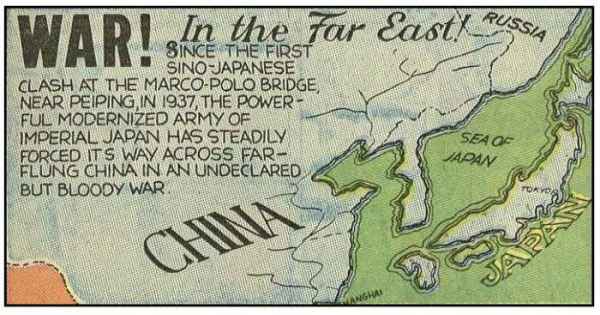
1937 The Japanese fleet blockades the Chinese coast.
1939 War impending: Various:
Mediation: Birger Dahlerus—Swiss businessman and friend of Goering—lands in Croydon, England, in Goering's private plane. Dahlerus personally gives copies of Hitler's proposals for a peaceful settlement of the Danzig problem to Lord Halifax.
At 8 o'clock in the evening I tried to reach him on the telephone, but only after I had obtained help from the Foreign Office was I able to establish the connection. Goering revealed to me then that the situation had become extremely serious and asked me to do everything in my power to arrange a conference between representatives of England and Germany.
Poland:
Colonel Walery Slawek, a Polish opponent of the anti-German policies of Marshal Smigly-Rydz and President Moscicki, and a strong proponent of Marshal Pilsudski's pro-German policy, is murdered and his death ruled a suicide, even though two bullets are found in his body. (THP)
Incidents along the Polish-German border increase in number. In Makeszowa, near Katowice, German soldiers take over the court house and railway station. Poles break into and wreck the offices of a German newspaper. More Polish reservists are called up and cars and horses are requisitioned.
An Agreement of Mutual Assistance is signed with the United Kingdom: Should one of the Contracting Parties become engaged in hostilities with a European Power in consequence of aggression by the latter against that Contracting Party, the other Contracting Party will at once give the Contracting Party engaged in hostilities all the support and assistance in its power."
President Moscicki replies to President Roosevelt's appeals for peace:
Although I clearly wish to avoid even the appearance of desiring to profit by this occasion to raise points of litigation, I deem it my duty, nevertheless, to make clear that in the present crisis it is not Poland which is formulating demands and demanding concessions of any other State. It is, therefore, perfectly natural that Poland should hold aloof from any action of this kind, direct or indirect.
Hitler confers with British Ambassador Henderson—telling him that "Poland's provocations have become intolerable." Hitler then makes several new proposals to Britain, whose friendship, Hitler says, he has "always sought." In conclusion, Hitler strongly urges Henderson to leave for London that same day with these new proposals. Telegram from Henderson to Viscount Halifax:
Conversation lasted an hour, my attitude being that Russian Pact in no way altered standpoint of His Majesty's Government, and that I must tell him quite honestly that Britain could not go back on her word to Poland and that I knew his offer would not be considered unless it meant a negotiated settlement of the Polish question. Herr Hitler refused to guarantee this on grounds that Polish provocation might at any moment render German intervention to protect German nationals inevitable. I again and again returned to this point but always got the same answer.
President Roosevelt once again appeals to Hitler for peace:
Countless human lives can yet be saved and hope may still be restored that the nations of the modern world may even now construct the foundation for a peaceful and happier relationship, if you and the Government of the German Reich will agree to the pacific means of settlement accepted by the Government of Poland. All the world prays that Germany, too, will accept.
Hitler to Mussolini:
I have not kept you informed in detail, Duce, since I did not have an idea of the possible extent of these (German-Russian) conversations, or any assurance of the possibility of their success. The readiness on the part of the Kremlin to arrive at a reorientation of its relations with Germany, which became apparent after the departure of Litvinov, has become ever stronger in the last few weeks and has made it possible for me, after successful preparation, to send my Foreign Minister to Moscow for the conclusion of a treaty which is the most extensive non-aggression pact in existence and whose text will be made public. The pact is unconditional and includes also the obligation for consultation about all questions affecting Russia and Germany. I may tell you, Duce, that through these arrangements the favorable attitude of Russia in case of any conflict is assured, and that the possibility of the entry of Rumania into such a conflict no longer exists.
Mussolini to Hitler: Concerning the agreement with Russia, I approve of that completely...As for the practical position of Italy, in case of a military collision, my point of view is as follows: If Germany attacks Poland and the conflict remains localized, Italy will afford Germany every form of political and economic assistance which is requested. If Germany attacks, and Poland's allies open a counterattack against Germany, I want to let you know in advance that it would be better if I did not take the initiative in military activities in view of the present situation of Italian war preparations, which we have repeatedly previously explained to you, Fuehrer, and to Herr von Ribbentrop. Our intervention can, therefore, take place at once if Germany delivers to us immediately the military supplies and the raw materials to resist the attack which the French and English especially would direct against us. At our meetings the war was envisaged for after 1942 and at such time I would have been ready on land, on sea, and in the air according to the plans which had been arranged. I am also of the opinion that the purely military preparations which have already been undertaken and the others which will be entered upon in Europe and Africa will serve to immobilize important French and British forces. I consider it my implicit duty as a true friend to tell you the whole truth and inform you about the actual situation in advance. Not to do so might have unpleasant consequences for us all. This is my point of view and since within a short time I must summon the highest governmental bodies of the realm, I ask you to let me know yours as well.
After reading this answering letter from Mussolini, Hitler postpones his invasion of Poland scheduled for 4:30 AM the following morning.
1940 World War II: The Luftwaffe begins mounting almost daily attacks on British ports, airfields, and industrial centers in southern England. Strict orders from Hitler forbid attacking civilian targets, especially London. Note: The Germans have a total force of 900 fighters, mostly Messerschmitt BF-109s, and 1,300 bombers. The RAF has much smaller forces, about 650 Hurricanes and Spitfires, but newly developed radar enables it to concentrate its defenses. (THP)
[See: Why Did Hitler Lose The Battle of Britain?]
1941 World War II: Various: From the Diary of Rear Admiral Giichi Nakahara: People of the Combined Fleet and Sasebo Naval Station came up to Tokyo and met. Though they had intended to practice necessary training from the point of operation 1 SEPT High-speed training 11 SEPT For a week with new organization 15 SEPT Commissioning of petty officers 1 OCT By this date the promotions and changes of sailors and enlisted men will be finished (petty officers in September). The date may be advanced . . . At the beginning of October rendezvous . . . Each force will conduct training separately around Kyushu . . . After these, day battle and night battle of the Combined Fleet. Iran is invaded and occupied by both Britain and the USSR: Its ruler, Reza Shah Pahlavi, is pro-German. Within four days the Soviet Union and England are in complete control.
Reza Shah appeals to American President Franklin Roosevelt under the Atlantic Charter: " . . . . on the basis of the declarations which Your Excellency has made several times regarding the necessity of defending principles of international justice and the right of peoples to liberty. I beg Your Excellency to take efficacious and urgent humanitarian steps to put an end to these acts of aggression. This incident brings into war a neutral and pacific country which has had no other care than the safeguarding of tranquility and the reform of the country.
Barbarossa: Heeresgruppe Sued advances from the Gomel area toward Kiev in the Ukraine. Units of 1st Panzergruppe establish a bridgehead at Dnepropetrovsk across the Dnepr river, the last natural barrier west of Moscow.
For the invasion of the Soviet Union, the Germans had set up three army groups, designated as North, Center, and South, with one aimed toward Leningrad, one toward Moscow, and one toward Kiev. Hitler and his generals had agreed that their main strategic problem was to lock the Soviet army in battle and to defeat it before it could escape into the depths of the country. They disagreed on how that goal could best be accomplished. Most of the generals believed that the Soviet regime would sacrifice everything to defend Moscow, since it was the capital, the hub of the road and railroad networks, and the country's main industrial center. Hitler believed that the land and resources of the Ukraine and the oil of the Caucasus were more important, and he wanted to seize Leningrad as well. The result had been a compromise—the three thrusts, with the one by Army Group Center toward Moscow the strongest—that temporarily satisfied Hitler as well as the generals.
1942 World War II: Various: Battle of Milne Bay—Papua New Guinea—fighting continued until the Japanese retreated on September 5, 1942. The battle was the first in the Pacific campaign in which Allied troops defeated Japanese land forces. The British Field Marshal Sir William Slim, who had no part in the battle, said: "Australian troops had, at Milne Bay, inflicted on the Japanese their first undoubted defeat on land. Some of us may forget that, of all the allies, it was the Australians who first broke the invincibility of the Japanese army."
Battle of the Eastern Solomons (second day): A Japanese naval transport convoy headed towards Guadalcanal is turned-back by Allied air attack, losing one destroyer and one transport sunk, and one light cruiser heavily damaged.
1943 World War II: Various: Lord Louis Mountbatten is appointed Supreme Allied Commander in Southeast Asia.
It was there that he planned and directed the freedom of Burma and Singapore from the Japanese Army. Many of the troops who fought for Britain in Asia felt that they had been forgotten by the military and by the people back home. Mountbatten used his charm to raise spirits. But this problem was best solved by victories against the Japanese at Arakan and Imphal.
Wunderwaffen: The Allies again bomb the German rocket laboratory on Peenemunde, setting back production by two months. Eduard Schulte passes along damage reports to Allen Dulles in Switzerland.
Once the war broke out, Schulte decided to pass on information to the Allies in the hope that it might hasten Hitler's defeat. Traveling frequently from Germany to Switzerland, Schulte regularly served as an informant for Swiss and Polish intelligence services, which had contact with the British and American intelligence services.
1944 World War II: Paris liberated: After more than four years of Nazi occupation, Paris is liberated by the French 2nd Armored Division and the U.S. 4th Infantry Division. German resistance was light, and General Dietrich von Choltitz, commander of the German garrison, defied an order by Adolf Hitler to blow up Paris' landmarks and burn the city to the ground before its liberation. Choltitz signed a formal surrender that afternoon, and on August 26, Free French General Charles de Gaulle led a joyous liberation march down the Champs d'Elysees . . . .
The French 2nd Armored Division was formed in London in late 1943 with the express purpose of leading the liberation of Paris during the Allied invasion of France. In August 1944, the division arrived at Normandy under the command of General Jacques-Philippe Leclerc and was attached to General George S. Patton's 3rd U.S. Army. By August 18, Allied forces were near Paris, and workers in the city went on strike as Resistance fighters emerged from hiding and began attacking German forces and fortifications.
At his headquarters two miles inland from the Normandy coast, Supreme Allied Commander Dwight D. Eisenhower had a dilemma. Allied planners had concluded that the liberation of Paris should be delayed so as to not divert valuable resources away from important operations elsewhere. The city could be encircled and then liberated at a later date.
On August 21, Eisenhower met with de Gaulle and told him of his plans to bypass Paris. De Gaulle urged him to reconsider, assuring him that Paris could be reclaimed without difficulty. The French general also warned that the powerful communist faction of the Resistance might succeed in liberating Paris, thereby threatening the re-establishment of a democratic government. De Gaulle politely told Eisenhower that if his advance against Paris was not ordered, he would send Leclerc's 2nd Armored Division into the city himself.
On August 22, Eisenhower agreed to proceed with the liberation of Paris. The next day, the 2nd Armored Division advanced on the city from the north and the 4th Infantry Division from the south. Meanwhile, in Paris, the forces of German General Dietrich von Choltitz were fighting the Resistance and completing their defenses around the city. Hitler had ordered Paris defended to the last man, and demanded that the city not fall into Allied hands except as "a field of ruins." Choltitz dutifully began laying explosives under Paris' bridges and many of its landmarks, but disobeyed an order to commence the destruction. He did not want to go down in history as the man who had destroyed the "City of Light"—Europe's most celebrated city.
The 2nd Armored Division ran into heavy German artillery, taking heavy casualties, but on August 24 managed to cross the Seine and reach the Paris suburbs. There, they were greeted by enthusiastic civilians who besieged them with flowers, kisses, and wine. Later that day, Leclerc learned that the 4th Infantry Division was poised to beat him into Paris proper, and he ordered his exhausted men forward in a final burst of energy. Just before midnight on August 24, the 2nd Armored Division reached the Hotel de Ville in the heart of Paris.
German resistance melted away during the night. Most of the 20,000 troops surrendered or fled, and those that fought were quickly overcome. On the morning of August 25, the 2nd Armored Division swept clear the western half of Paris while the 4th Infantry Division cleared the eastern part. Paris was liberated.
In the early afternoon, Choltitz was arrested in his headquarters by French troops. Shortly after, he signed a document formally surrendering Paris to de Gaulle's provincial government. De Gaulle himself arrived in the city later that afternoon. On August 26, de Gaulle and Leclerc led a triumphant liberation march down the Champs d'Elysees. Scattered gunfire from a rooftop disrupted the parade, but the identity of the snipers was not determined. [For further details, Click here.]
The Joint CROSSBOW Target Priorities Committee (established July 21) prepares the Plan for Attack on the German Rocket Organization when Rocket Attacks Commence—in addition to the bombing of storage, liquid-oxygen, and launch sites, the plan includes aerial reconnaissance operations. (Gruen) 1944 World War II: Churchill to FDR:
As Stalin's reply evades the definite question asked and adds nothing to our knowledge, I propose a reply on the following lines . . . . (draft text inserted) . . . . .In the event of his failing to reply to this my feeling is that we ought to send the planes and see what happens. I cannot believe that they would be ill-treated or detained . . . .
The Romanian government declares war on Germany:
The Soviet army overran most of Transnistria in the spring of 1944. Bessarabia was conquered in the first weeks of the summer offensive. As Soviet troops massed on the Prut River, which separates Moldavia from Bessarabia, a group of opposition politicians, supported by King Michael, overthrew Antonescu and signed an armistice with the Soviet Union on August 23, 1944. Romanian troops then fought alongside Soviet troops through Hungary and into Germany.
1945 Various: The first casualty of the Cold War:
On this day in 1945, John Birch, an American missionary to China before the war and a captain in the Army during the war, is killed by Chinese communists days after the surrender of Japan, for no apparent reason.
After America had entered the war, Birch, a Baptist missionary already in China, was made a liaison between American and Chinese forces fighting the Japanese. But on August 25, Birch, commanding an American Special Services team, was ordered to halt by Chinese communist troops. A scuffle ensued, and Birch was shot dead.
In the 1950s, Robert Welch would create a right-wing, anticommunist organization called the John Birch Society. For Welch, Birch was "the first casualty in the Third World War between Communists and the ever-shrinking Free World." (History.com)
Jewish immigrants are permitted to leave Mauritius for Palestine.
1967 Death: George Lincoln Rockwell, American Nazi party leader, assassinated by a sniper at a laundromat in Arlington, Virginia.
1997 Egon Krenz—East Germany's last hard-line Communist leader—is sentenced to six-and-a-half years in jail for the deaths of citizens killed as they tried to flee to the West over the Berlin Wall. He lodges an appeal the next day.
2012 Neil Armstrong, First Man on Moon, Dies at 82:
Neil Armstrong, a quiet, self-described nerdy engineer who became a global hero when as a steely-nerved pilot he made “one giant leap for mankind” with a small step on the moon, has died. He was 82.
Mr. Armstrong died following complications resulting from cardiovascular procedures, a statement Saturday from his family said. It didn’t say where he died.
Mr. Armstrong commanded the Apollo 11 spacecraft that landed on the moon July 20, 1969, capping the most daring of the 20th century’s scientific expeditions. His first words after setting foot on the surface are etched in history books and the memories of those who heard them in a live broadcast.
"That's one small step for (a) man, one giant leap for mankind," Mr. Armstrong said. [For further details, Click here.]
Edited by Levi Bookin (Copy editor) Click to join 3rdReichStudies Disclaimer: This site includes diverse and controversial materials—such as excerpts from the writings of racists and anti-Semites—so that its readers can learn the nature and extent of hate and anti-Semitic discourse. It is our sincere belief that only the informed citizen can prevail over the ignorance of Racialist "thought." Far from approving these writings, this site condemns racism in all of its forms and manifestations. 
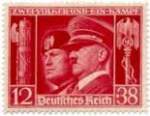
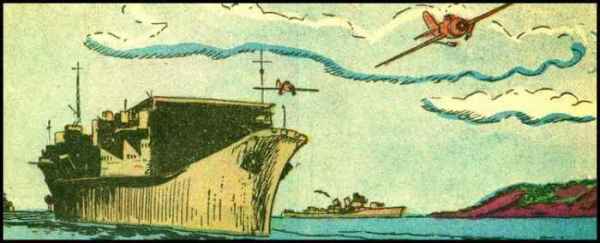
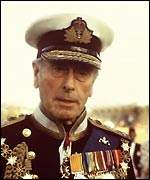

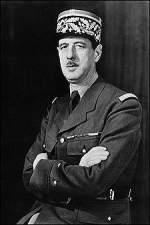
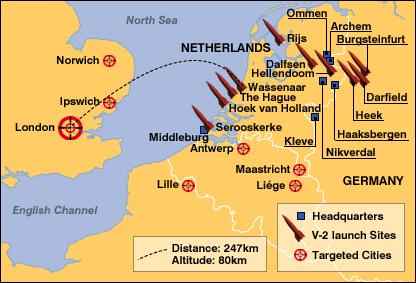
levi.bookin@gmail.com










Fair Use Notice: This site may contain copyrighted material the use of which has not always been specifically authorized by the copyright owner. We are making such material available in our efforts to advance understanding of historical, political, human rights, economic, democracy, scientific, environmental, and social justice issues, etc. We believe this constitutes a "fair use" of any such copyrighted material as provided for in section 107 of the US Copyright Law. In accordance with Title 17 U.S.C. Section 107, the material on this site is distributed without profit to those who have expressed a prior interest in receiving the included information for research and educational purposes. If you wish to use copyrighted material from this site for purposes of your own that go beyond 'fair use', you must obtain permission from the copyright owner.
Please Note: The list-owner and moderators of 3rdReichStudies are not responsible for, and do not necessarily approve of, the random ads placed on our pages by our web server. They are, unfortunately, the price one pays for a 'free' website.



